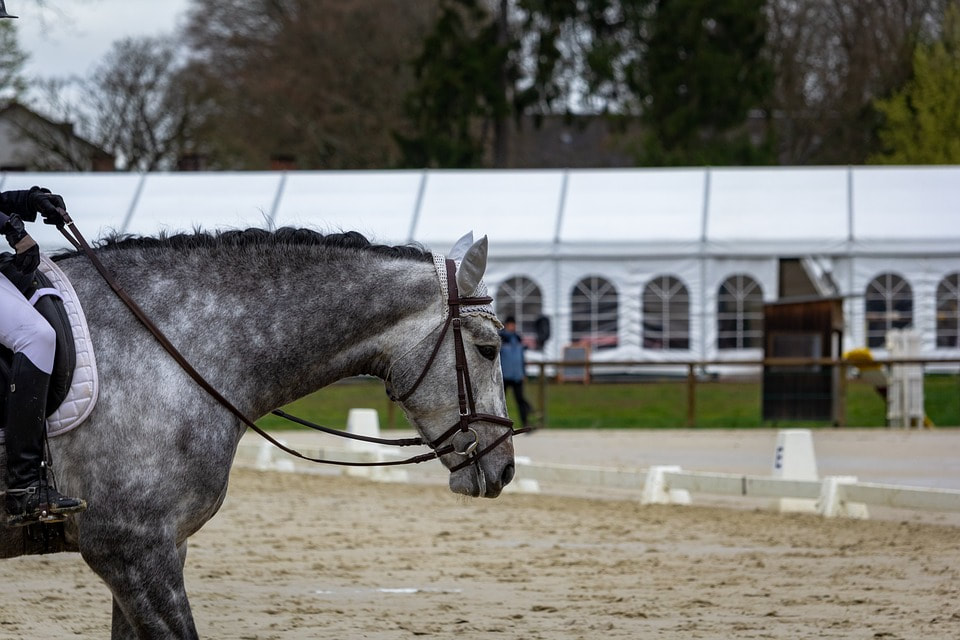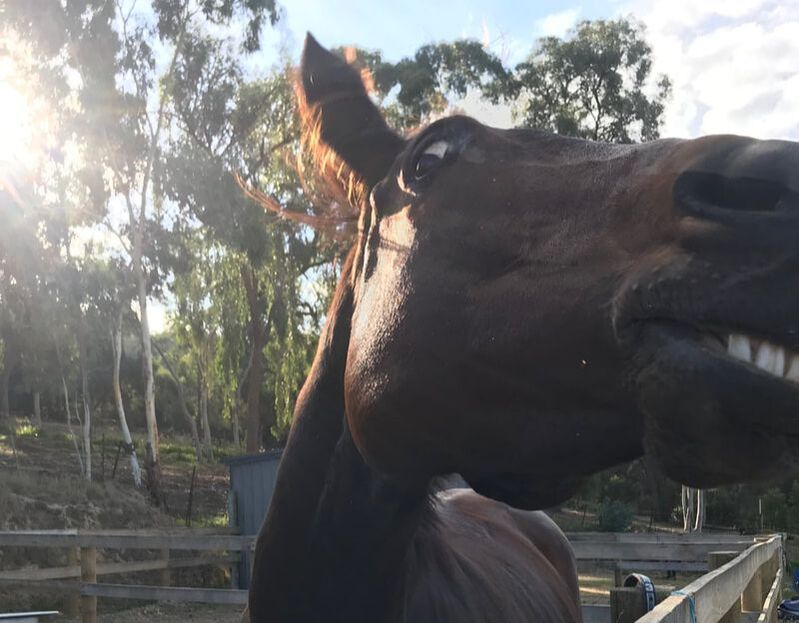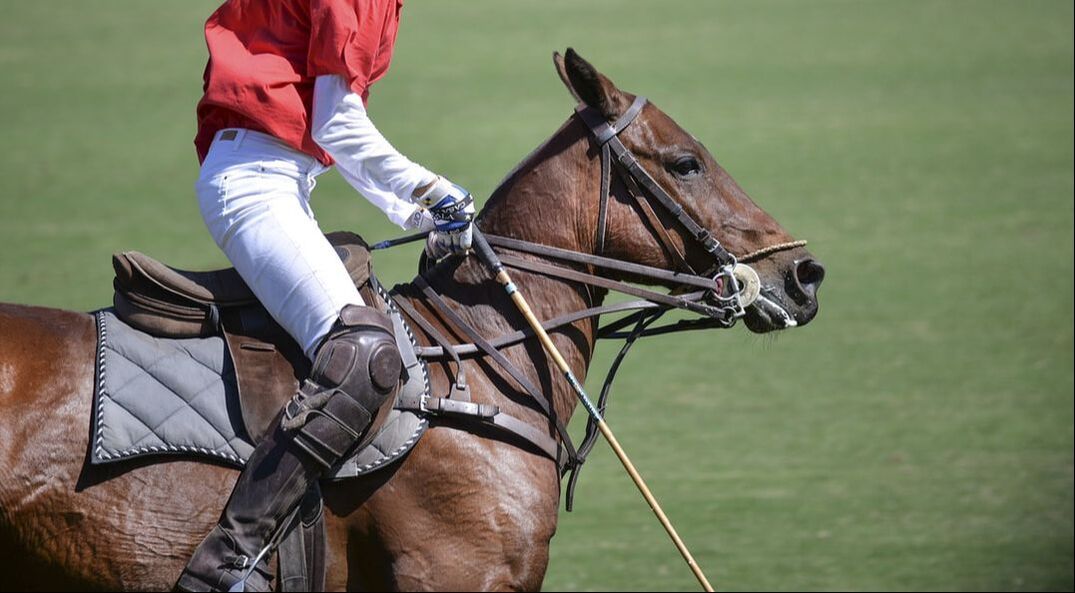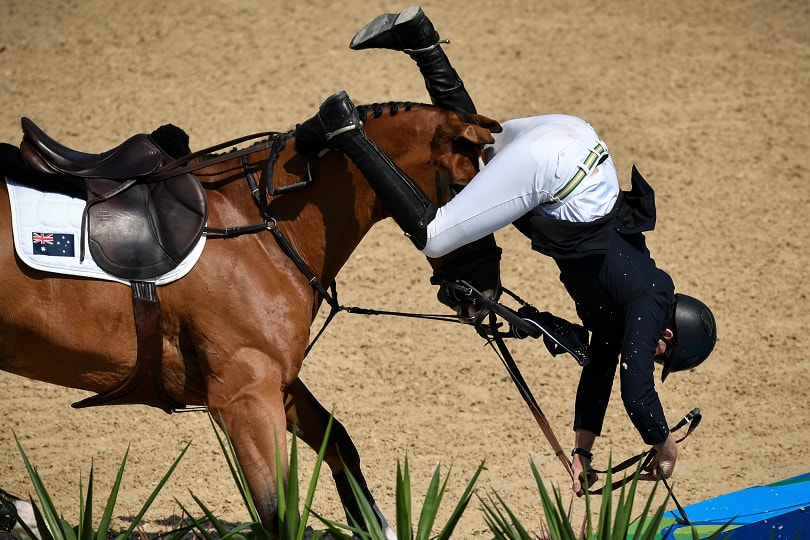|
The last few weeks have seen the vets at our place several times. A freak altercation with a gate saw my young mare take a chunk out of her leg, an older horse is having regular chiropractic treatment and it was the annual vet dentist visit. All the while in the background I have been analysing data from my research and uncovering some pretty interesting results (but more on that another time). Put it all together and I started thinking, I wonder how many of my fellow horse people take the time to think about what they want out of their relationships with their horses, and are they getting the results they want? What activities give you the most joy when you are with your horse? Is your relationship with your horse exactly as you would like it to be? I ask these questions because I feel like so many people are not thrilled with how their horse is going. I see it on social media, I hear people talk about their horse going through an "arsehole" phase (or something similar) when things are not going well. I also come across people who are just plain scared of their horse - and when I meet their horse I understand why, it is an aggressive, uncooperative giant. Remember the saying (no idea who said it), but the saying is something like, "if you always do, what you always did, you'll always get, what you always got". Maybe its time to shake things up a little? OMG I hear you say - not another "new" horse training method!" What I am suggesting is not another training method. What I am suggesting is a different approach to caring for and training your horse. And I'm not saying the method you are using is wrong - I am just suggesting that something different might give you different (and just maybe, better) results. So here we go. What type of horse owner/rider do you want to be? If you stop and think about it, horses have very few choices in their lives. We decide where they live, how they live, what they eat, who their friends are (if we even let them have friends), what job they do, and so on it goes. We decide everything! So when you think about the decisions you make for your horse - would you like to have you for an owner? Thinking too hard about these things can be a bit confronting, and if you are new to horses, sometimes you really just don't know, and you hear so many conflicting opinions - it can be hard to know if you are an owner a horse would like. The thing that I have worked out from a lifetime of owning horses and two years of full-time research, is that many of the things we do for horses we do for our benefit and giving us what we want, rather than always what is best for the horse. Myself included. Let me explain by giving you an example, and go back to my horse with the cut leg. This same horse had a nasty bout of colic just over 12 months ago and at that time we had to give her lots of injections for pain relief and blood tests, etc. She started off ok, but gradually was becoming more and more needle shy. Last week when she cut her leg, she would not let the vet (who was holding an injection to sedate her so we could tend her leg) get within a metre of her without rearing. Often, the next step in this situation would be to physically restrain her with a twitch and then inject her. I did not go down the path of the twitch, instead we put the injection away and fortunately the cut was superficial enough that we could give it a basic clean and leave it at that (now I know this is not always possible, and sometimes you simply must "get the job done", but this time we were lucky). I hear you saying, wow, some horse person you are, you let her win and now she knows she doesn't have to get injections. Not quite. Now here is where my new approach comes in. First of all, when I am interacting with my horse, I never approach things as a fight that I have to win. I definitely have goals that I want to achieve (like cleaning her leg), but I also respect that she is entitled to have an opinion about my goals, and sometimes she won't like them and will object. And sometimes, when she objects strongly (aka rearing), I put our relationship ahead of my goal, and follow her suggestion. But please note, she hasn't won and I haven't lost, we have made a decision together about what we should do in that moment (sounds a bit like partnership doesn't it?). Ask yourself, do I want to fight with my horse? Do I think of situations as win/lose and does thinking this way help me with my horse? But what about the injection I hear you say? I'm so glad you asked :) So after a few days passed and she was not so sore on her leg, I realised the vet dentist was coming...the next day!...and she would need to be sedated for her dental. That afternoon, I spent 10 minutes with an old injection with a cap on the needle and trained her to allow me to palpate her vein (just like the vet would need to do the next day) and stand still. Then I trained her to allow me to poke the vein (gently, with the sharp point of the needle) and stand still. Ten minutes of training. The next morning my young mare was first up, I explained to the vet her history of needle-shyness and suggested an approach which built upon the training I had done the day before. Five minutes of training with the vet and I working together and she was probably the easiest horse to sedate that day - she stood quietly and didn't even flinch when the IV was put in. To see this technique in action, visit "Don't Break Your Vet", here. So how did just 15 minutes of training transform a horse from rearing at the sight of a needle to standing like a lamb to get an IV? I am not a miracle worker! I have invested almost 2 years into gaining the trust of this mare and taken her from a horse that would quite literally attack me with her feet and teeth, to a friendly, affectionate, (relatively) calm horse. To get results like I have described takes time, but anyone can do it. Here are my 4 tips to a new approach to caring for and training your horse. 1. When she speaks to me through her behaviour, I listen. I don't always agree with her or do as she suggests, but I do listen with an open mind and decide what to do, and I am always thinking about tomorrow (because shortcuts today will likely mean twice as long tomorrow). 2. I always give my horses the benefit of the doubt. You will never hear me describe my horse as a bitch, an arsehole, or any other derogatory name - I never say it because I never think it. Do I get frustrated sometimes and wish they would not spook at the rug on the ground that I took off them 30 minutes ago - of course!!!! But I never let that spill over into believing they are anything other than kind, generous and incredibly accommodating creatures and I am lucky to have them. 3. I recognise that I don't know the whole story. This means I accept that there are things in my horse's life that I don't and can't know. I'm not a horse, I will never know what its like to be a horse. Therefore, when my horse behaves in a way I don't expect, I assume that its my expectations that might need adjusting, not my horse. 4. I don't assume that just because something worked well with my horse yesterday, it will work the same way today. Horses aren't machines, they are not like a car where you put your foot on the accelerator and off you go. Think about yourself. Do you feel the same way every day? Of course not. Then why would our horses feel the same every day? It means I am always prepared to be flexible and try different ways of doing things, or as in the case with needle, just abandon the idea and try again another day with another approach. If some of this sounds a bit wishy washy and not at all like the approach you have been taught, that's ok, the whole idea of this post was to offer you something new and different. If you feel like you are making progress and happy with the approach you currently have - fantastic, you are clearly doing something right. But if things are not going so well and you feel like its time to try something different or you feel like you and your horse could have a better partnership, have a think about some of the things I have talked about in this post. And if you would like to receive my newsletter containing more ideas and results from my research, please sign up here - Newsletter As always, thanks for reading and happy horsing, Karen :)
0 Comments
I was in a meeting the other day and one of the committee members started talking about a pony. They were describing the pony's behaviour and using words like "naughty" and the pony needing a "tune-up" and a couple of other colourful adjectives which I won't repeat here! These terms are used pretty frequently by owners and trainers when horses are not doing what is expected, ie they are being naughty!
The words we use say a lot about how we think about things and they are powerful. Think about how the use of certain words has become unacceptable because they are derogatory and cause great offense to some members of our community. For example, when I was growing up here is Australia there was a popular TV show called "Wogs out of work" - it looks very dated now, but at the time it was belly laugh material! So what has all this got to do with horses? I'm so glad you asked :) The language we use both affects and reflects how we think. For example, when we describe our horse as "naughty" we are saying quite a lot about both ourselves and our horse. If we consider a child is naughty then we believe they are choosing to behave in a way that they know they shouldn't, like stealing candy from a store. So when we say our horse is naughty, we are saying that our horse knows what the right thing to do is, but they are willfully choosing not to to do the right thing. This suggests that the owner of the "naughty horse" believes a few things. 1. They believe that the horse is obligated to do what its owner wants it to, that the horse has a duty to perform. 2. The horse is capable of knowing what behaviour the owner thinks it should perform at this moment. 3. And lastly, that the horse not only knows what the correct thing to do is, but they are making a conscious choice not to perform the correct behaviour. Now 2. and 3. are some pretty complex cognitive processes for a horse to perform, and 1. is a pretty deep philosophical idea for all of us to ponder. Let's just focus on 2. and 3. Most of the time when a horse's behaviour is causing us problems it is some kind of over-reaction to a situation that to us seems perfectly fine. For example, I can recall a disastrous training session I had with my horse a while ago. Every time I asked my horse to canter she would run and then pigroot. Now, we could consider this behaviour "naughty" because she was supposed to canter. Or we could consider things from the horses perspective and search for a reason why she did not do as she was asked. After trying lots of things I found my mare had a sore back and clearly cantering was very painful for her, so she did all she could not to canter. If I had chosen to call her "naughty", I probably would have just used my whip a bit more and put on some spurs to make her canter. And I would not have investigated her behaviour and got a vet to x-ray her back and found the problem. So you can see that the words we use influence our thoughts and they in turn influence what we do. So many people in the horse world are working hard to make things better for horses and for the people who interact with them. And things are slowly changing for the better. While we don't have to become hung up on every word we speak, I think pausing occasionally and just thinking about the words that we use when it comes to our horses might just help push things along even more. As always, thanks for reading and happy horsing, Karen :) What a week its been to be a researcher in horse welfare and safety! I feel like the world's appetite for images like the one above is steadily decreasing, and many horse owners and the public are wanting change.
Early in the week I attended an international conference where I presented a poster regarding the opportunity that exists for equestrian organisations, such as the FEI, to become leaders in horse welfare protection through updating and enforcing the rules of equestrian sport. My presentation also pointed out that if organisations continue to ignore horse welfare issues, they are gambling with the long term future of equestrian sport. The later part of the week saw the equestrian phase of the women's modern pentathlon where riders and coaches were seen mistreating horses in the name of Olympic glory. Equestrian sports face an ethical dilemma - a horse is not like a tennis racquet or a basketball, a horse is a sentient being not a thing - yet when it comes down to it, for many equestrians, horses are a tool of the trade. And as we saw this week in the modern pentathlon, if the tool (horse) does not perform as expected, then the tool can be subject to some very harsh treatment. Given both the German rider and coach were well aware that the world was watching and yet they both chose to punish the horse very harshly, it makes you wonder at the punishment that under-performing horses in more private settings might endure. Decreasing tolerance of horse abuse in sport The outpouring of concern for the horses participating in the modern pentathlon on social media shows that the community's tolerance for horse abuse is rapidly diminishing. In the past when people outside the horse industry voiced concern for horses' welfare, such as in racing, they were dismissed by experts saying they don't know what they are looking at, they couldn't possibly understand. However, with the high visibility of equestrian sports now on both social and mainstream media, it is more difficult to dismiss community concerns as the misunderstanding of an uninformed observer. For example, a coach punching a horse, as happened this week with the German modern pentathlon coach who punched her athlete's horse because it refused to go is doesn't need expert knowledge to interpret. (It would be good to think this type of behaviour is rare, but I have witnessed a horse being punched at an event at twice, once by an elite competitor and once by someone competing at club level). Safe-guarding equestrian sport I am not suggesting an end to equestrian sport. But I am suggesting we need to make changes to protect the "equestrian" aspect of equestrian sport - the horses. Around the world people are working hard and coming up with all sorts of strategies to help improve animal welfare, it can be done. A critical step is equestrian organisations stepping up and implementing and enforcing rules to protect horses. Continuing to deny the issue is no longer a viable option and is likely to lead to the demise of equestrian sport. And as individuals, we can all play a role in protecting horse welfare. The level of horse welfare we have is the level of horse welfare we accept. Things we can all do to help make our horses lives better:
Although what we saw in the modern pentathlon at Tokyo was horrible, the fact that it has got people talking about horse welfare in sport is great. We need to have more of these conversations. We need to be hard on the sports and insist that they protect horse welfare, but we need to be soft on each other. That doesn't mean we allow abuse, but it means we need to coach each other and always be on the lookout for better ways, more humane ways of caring for and training our horses. Let's all talk more, commit to being open to new ideas. Let's ask more questions. And of course celebrate our wins, but never at the expense of our horse. And remember, the true test of your horsemanship and riding skill isn't how much you love your horse...its how much your horse loves you! #myhorseskeeper Thanks for reading and happy riding, Karen :) I have ridden horses pretty much my whole life. Some horses have been fabulous and gifted me treasured memories of galloping around cross country, soaring over fences and feeling very much in control and safe. Other horses on the other hand, have been incredibly unpredictable and buried me in the dirt multiple times...my injuries from riding span from minor bumps and bruises through to serious concussion (numerous times), fractured ribs, broken toes, and a ruptured ACL in my knee from a cross country fall. My children and friends have also sustained some serious injuries including acute brain injuries, a broken pelvis, a broken neck, a broken leg and numerous broken arms. Many of these have led to hospital admissions and surgery and then a long road to recovery. And the research backs up my personal experience - horse riding is one of the most dangerous sporting activities a person can choose, more dangerous than rugby or motorcycle racing!
All of these accidents have made me wonder what is going on, why are there so many accidents? Some riders just accept that the horse is an unpredictable prey animal, so really, what can we expect? But as a rider I feel like I ride all horses more or less in the same way. So why is it that some horses are safe, and others decidedly not safe? From the all research I have read, I don't think anyone really knows the answer to this question. The most we can say about horse-related accidents, is that in general they are caused by horse behaviour. A horse does something - bucks, spooks, rears and so on - and we fall off. But almost no research has gone beyond describing what horses are doing when riders get injured, and tried to understand what is it that makes horse riding so dangerous? I love horses and I love riding, but I hate that so many people get injured, so I have set up a study through Central Queensland University to try to find some answers. This study is part of my Masters degree, and I am currently recruiting riders from all disciplines and all levels, from beginners through to professionals. You can help answer these questions by completing this survey - it only takes about 20 minutes, and your answers could help find new ways to make riding safer for us all. Australian Equine Safety Survey Welcome to My Horse's Keeper - a blog all about ridden horses. The blog will cover everything from ideas about horse nutrition to the rules of equestrian of sport, and everything in between. Whether you have just purchased your first horse, or you have owned and ridden horses for decades, this blog will have something for everyone. The idea is to shake things up a little and share quality, well researched information so owners, riders and coaches can make choices about their horse training and management based on data, rather than relying on the traditional "that's how we have always done it" approach.
I am lucky enough to have owned and ridden horses for over thirty years. My passion is eventing, I especially love galloping around a cross country course. And as I have gotten older, I have learned to appreciate the beauty of the ideals of dressage. My other passion is research, so when I am not out with my horses, I spend lots of time reading, analysing and reviewing the work of other scientists, as well as working on my own research degree. But I understand most people are super busy and don't have the time to spend hours reading like I do...yet there is so much great information out there that could help horses and their owners. So...my goal is to take the latest scientific research on ridden horses and create interesting, easy to read posts that offer practical tips that you can try with your horse. Hopefully you find something that makes life for you or your horse better. Welcome, thanks for reading and I hope you enjoy My Horse's Keeper. Karen :) |
AuthorI am a long-time horse owner, rider and registered coach. I'm also researching horse-related safety. My goal is to find ways to improve horse-human interactions so both horses and people benefit and stay safe. Archives
October 2021
Categories |







 RSS Feed
RSS Feed